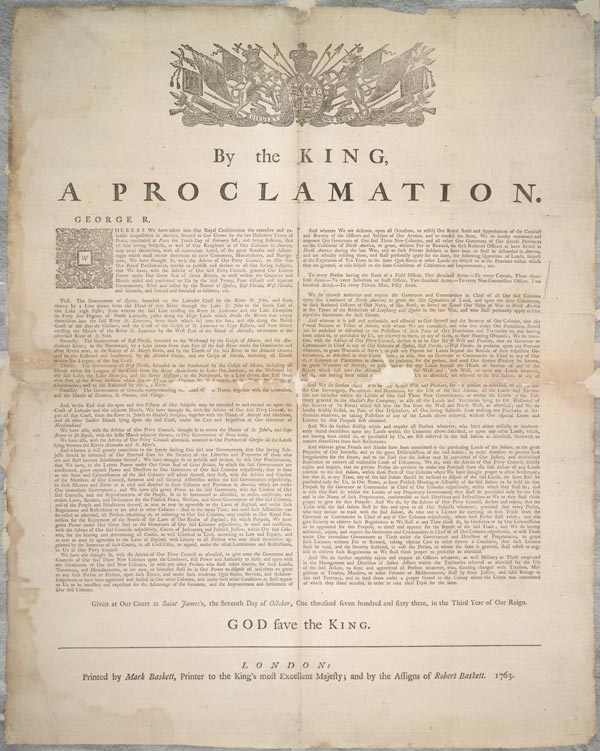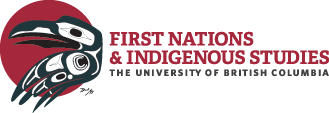
What is the Royal Proclamation?
The Royal Proclamation is a document that set out guidelines for European settlement of Aboriginal territories in what is now North America. The Royal Proclamation was initially issued by King George III in 1763 to officially claim British territory in North America after Britain won the Seven Years War. In the Royal Proclamation, ownership over North America is issued to King George. However, the Royal Proclamation explicitly states that Aboriginal title has existed and continues to exist, and that all land would be considered Aboriginal land until ceded by treaty. The Proclamation forbade settlers from claiming land from the Aboriginal occupants, unless it has been first bought by the Crown and then sold to the settlers. The Royal Proclamation further sets out that only the Crown can buy land from First Nations.
Most Indigenous and legal scholars recognize the Royal Proclamation as an important first step toward the recognition of existing Aboriginal rights and title, including the right to self-determination. In this regard, the Royal Proclamation is sometimes called “the Indian Magna Carta.” The Royal Proclamation set a foundation for the process of establishing treaties. For example, treaty-making typically involved presence of both parties — the First Nation and the government, for there to be some form of consent between the two, and for the First Nation to be compensated for any lands or resources taken. However, the Royal Proclamation was designed and written by British colonists without Aboriginal input, and clearly establishes a monopoly over Aboriginal lands by the British Crown.
Is the Royal Proclamation still valid?
Some argue that the Royal Proclamation is still valid in Canada, since no law has overruled it.1 The Royal Proclamation is enshrined in Section 25 of the Constitution Act; this section of the Charter of Rights and Freedoms guarantees that nothing can terminate or diminish the Aboriginal rights outlined in the Proclamation. The Royal Proclamation also applied to the United States; however, American independence from Great Britain after the Revolutionary War rendered it no longer applicable. The United States, however, eventually created its own similar law in the Indian Intercourse Acts.
Despite arguments that the Proclamation is still valid, Aboriginal peoples continually have had to prove their existing title to the land through legal disputes. In British Columbia in particular, this issue has been of prime concern amongst Aboriginal groups. The vast majority of the province has never been ceded by its Aboriginal peoples, resulting in the argument that non-Aboriginal settlement in B.C. is on stolen land. The Province of British Columbia has maintained that the Royal Proclamation does not apply to B.C. since it had not yet been settled by the British when the Proclamation was issued in 1763.2 This perspective is greatly disputed amongst government officials, academics, and the public, some who claim that the Proclamation would have applied to B.C. when British sovereignty was established in the province.
What does the Royal Proclamation say?
The following is an excerpt from the Royal Proclamation of 1763 that deals specifically with Aboriginal peoples:
And whereas it is just and reasonable, and essential to our Interest, and the Security of our Colonies, that the several Nations or Tribes of Indians with whom We are connected, and who live under our Protection, should not be molested or disturbed in the Possession of such Parts of Our Dominions and Territories as, not having been ceded to or purchased by Us, are reserved to them, or any of them, as their Hunting Grounds — We do therefore, with the Advice of our Privy Council, declare it to be our Royal Will and Pleasure, that no Governor or Commander in Chief in any of our Colonies of Quebec, East Florida. or West Florida, do presume, upon any Pretence whatever, to grant Warrants of Survey, or pass any Patents for Lands beyond the Bounds of their respective Governments. as described in their Commissions: as also that no Governor or Commander in Chief in any of our other Colonies or Plantations in America do presume for the present, and until our further Pleasure be known, to grant Warrants of Survey, or pass Patents for any Lands beyond the Heads or Sources of any of the Rivers which fall into the Atlantic Ocean from the West and North West, or upon any Lands whatever, which, not having been ceded to or purchased by Us as aforesaid, are reserved to the said Indians, or any of them.
And We do further declare it to be Our Royal Will and Pleasure, for the present as aforesaid, to reserve under our Sovereignty, Protection, and Dominion, for the use of the said Indians, all the Lands and Territories not included within the Limits of Our said Three new Governments, or within the Limits of the Territory granted to the Hudson’s Bay Company, as also all the Lands and Territories lying to the Westward of the Sources of the Rivers which fall into the Sea from the West and North West as aforesaid.
And We do hereby strictly forbid, on Pain of our Displeasure, all our loving Subjects from making any Purchases or Settlements whatever, or taking Possession of any of the Lands above reserved, without our especial leave and Licence for that Purpose first obtained.
And We do further strictly enjoin and require all Persons whatever who have either wilfully or inadvertently seated themselves upon any Lands within the Countries above described. or upon any other Lands which, not having been ceded to or purchased by Us, are still reserved to the said Indians as aforesaid, forthwith to remove themselves from such Settlements.
And whereas great Frauds and Abuses have been committed in purchasing Lands of the Indians, to the great Prejudice of our Interests. and to the great Dissatisfaction of the said Indians: In order, therefore, to prevent such Irregularities for the future, and to the end that the Indians may be convinced of our Justice and determined Resolution to remove all reasonable Cause of Discontent, We do, with the Advice of our Privy Council strictly enjoin and require, that no private Person do presume to make any purchase from the said Indians of any Lands reserved to the said Indians, within those parts of our Colonies where We have thought proper to allow Settlement: but that, if at any Time any of the Said Indians should be inclined to dispose of the said Lands, the same shall be Purchased only for Us, in our Name, at some public Meeting or Assembly of the said Indians, to be held for that Purpose by the Governor or Commander in Chief of our Colony respectively within which they shall lie: and in case they shall lie within the limits of any Proprietary Government, they shall be purchased only for the Use and in the name of such Proprietaries, conformable to such Directions and Instructions as We or they shall think proper to give for that Purpose: And we do, by the Advice of our Privy Council, declare and enjoin, that the Trade with the said Indians shall be free and open to all our Subjects whatever, provided that every Person who may incline to Trade with the said Indians do take out a Licence for carrying on such Trade from the Governor or Commander in Chief of any of our Colonies respectively where such Person shall reside, and also give Security to observe such Regulations as We shall at any Time think fit, by ourselves or by our Commissaries to be appointed for this Purpose, to direct and appoint for the Benefit of the said Trade:
And we do hereby authorize, enjoin, and require the Governors and Commanders in Chief of all our Colonies respectively, as well those under Our immediate Government as those under the Government and Direction of Proprietaries, to grant such Licences without Fee or Reward, taking especial Care to insert therein a Condition, that such Licence shall be void, and the Security forfeited in case the Person to whom the same is granted shall refuse or neglect to observe such Regulations as We shall think proper to prescribe as aforesaid.
And we do further expressly conjoin and require all Officers whatever, as well Military as those Employed in the Management and Direction of Indian Affairs, within the Territories reserved as aforesaid for the use of the said Indians, to seize and apprehend all Persons whatever, who standing charged with Treason, Misprisions of Treason, Murders, or other Felonies or Misdemeanors, shall fly from Justice and take Refuge in the said Territory, and to send them under a proper guard to the Colony where the Crime was committed, of which they stand accused, in order to take their Trial for the same.
Given at our Court at St. James’s the 7th Day of October 1763, in the Third Year of our Reign.
GOD SAVE THE KING
Recommended Resources & Further Reading
- Borrows, John. “Wampum at Niagara: The Royal Procalamation, Canadian Legal History, and Self-Government.” In Aboriginal and Treaty Rights in Canada: Essays on Law, Equality, and Respect for Difference. Vancouver: University of British Columbia Press, 1997. 155-172.
- Foster, Hamar. “Canada: ‘Indian Administration’ from the Royal Proclamation of 1763 to Constitutionally Entrenched Aboriginal Rights.” In Indigenous Peoples’ Rights in Australia, Canada, and New Zealand, Paul Havemann [Ed.]. Auckland: Oxford University Press, 1999. 351-377.
- Hutchings, Patricia Margaret, “The Argument for the Application of the Royal Proclamation of 1763 to British Columbia : Its Force and Effect,” thesis (LL.M.), University of British Columbia, 1987.
In this thesis, Patricia Margaret Hutchings argues for the continuing application of the Royal Proclamation of 1763 to assert Aboriginal title in British Columbia and examines its legal force and effect in relation to pre-Confederation colonial legislation. This thesis is available in UBC libaries.
Endnotes
1 Steckley, John L & Bryan D. Cummins, Full Circle, Canada’s First Nations. Toronto: Pearson Prentice Hall, 2008. 122.
2 Ibid.

